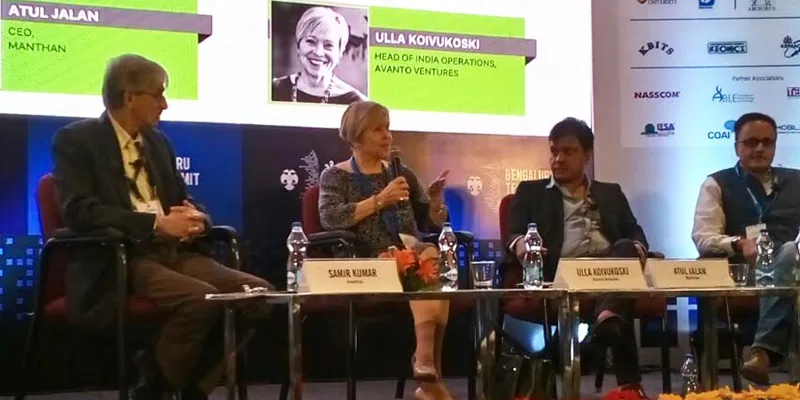Data is the new oil, but one must know what to do with it
Big data is an old and hackneyed term. The subject is even more relevant in this era of mobiles where tons of data is being used.
Let us take a car for example. Jonathan Aibe, a real estate broker, bought a new Mercedes GLC-300, an SUV that understands the road that he is driving on.
Mbrace Connect, the mobility platform from Mercedes, allows the car to connect to several apps over the cloud. From remote diagnostics and an in-vehicle WiFi hotspot to entertainment on TuneIn Radio and figuring out a good restaurant in the neighbourhood, the car offers these and more.

The app offers safety too — automatic collision and alarm notifications, SOS, and emergency call capabilities, all processed over the cloud. “The connectivity package I buy from Mercedes allows me to be connected to my surroundings at all times,” says Aibe.
What Aibe does not know is that the car is a device, and its mobility platform is crunching data that the car generates on a real-time basis. While the car collects structured data, the apps on board are also collecting data from social feeds like Twitter and LinkedIn.
With this data, apps can offer drivers better services. For example, based on usage patterns, it will know that the driver’s preferred language is Italian. But that’s not really what data collection is all about.
Imagine such patterns being collected and processed from millions of vehicles, and then analysed to provide insights that can help businesses make better decisions and plan strategies. A heated debated ensued at the on-going Bengaluru Tech Summit about the efficacy of data in the session titled, 'Tech Solutions: Mobile and Big Data Analytics.' The speakers included Nipun Mehrotra, Chief Digital Officer, IBM, Atul Jalan, CEO Manthan, Ulla Koivukosi, Head of India Operations, Avanto Ventures, Atul Jalan, CEO Manthan, and Samir Kumar, MD, Inventus.
“Everyone claims to be a Machine Learning (MI) startup and in five minutes I can tell that they are not Machine Learning startups,” says Samir Kumar, MD of Inventus. There is a need to understand Big Data comprehensively from the subject of ML and Artificial Intelligence (AI).
Big data analytics is the process of taking huge quantities of structured and unstructured data and using distributed computing platforms to combine and convert this into meaningful results.
Analytics companies take these results to understand consumer behaviour and offer predictive and prescriptive results for the 8.4 billion connected devices that Gartner predicts will exist on the planet in 2017.
Ulla Koivukoski, head of India operations Avanti Ventures Data, says “Data should be used to predict. You can do a lot with it, but data has limitations because some processes cannot be predicted by a machine.” For example, you can never really tell why people leave an organisation or why they do not perform. There are a lot of human elements that cannot be captured by programmed software.
Ulla added that she met a few data scientists in gaming, telco, and fraud detection and they were of the opinion that unless the business is aligned to data it is not going to grow. “Unfortunately companies only buy and create systems. They do not make it easy for their employees or their customers to understand data. It is very target driven and they don't know what the busines problem is,” she says.
Data is a long journey. To get the right data there has to be right use cases to create outcomes and all this depends on the statistical models that you build.
The big questions are how do you create ML and AI models in the organisation? “You cannot just buy something (tech tools) and achieve things,” she says. Ulla added that the organisation needs business to play with data and align it with technology and business strategy.
Nipun Mehrotra, CDO IBM says, “Having data does not make you a data company. Who makes more money in the oil business? It is the refiner, not the crude oil company.” He adds that people should look at Infonimics.
In Infonomics data creates revenue models as it is an asset and is aligned to business. “Data has value if you know how to put it to the right use. If you look at it, consumers have given their data to several apps, and businesses can now use it in anyway they want. However there are some ethical questions,” he says.
Perhaps one ethical question would be, why does an app want to read your SMS? On the regulatory front we need to do something. Atul Jalan, CEO of Manthan, says we live in an open data world and that India has created a good digital security bull. “Machine Learning mimics the human brain. We extended physical abilities and we are working towards a cognitive revolution. Technology is changing jobs and businesses. Millions of opportunities will be created for people. Technology is always at the forefront of human evolution. We have moved from manual to electric to artificial intelligence, so we cannot stop the tide,” says Atul Jalan.
However, he adds, data security and data privacy are two different things. “Today data is with several companies. How can I create my data model and then make it accountable to my life? Social graph portability is great for people because they can use it in their daily lives, getting jobs or getting married for example, and people should demand this from the companies that are making money with data,” says Atul Jalan.
The panel concluded with the opinion that data could mean many things and yet it may mean something only when you experiment and learn from it. Rolls Royce and GE have shown the way that data journeys are long and need a team to understand what can be done with it. Its time the founders and scientists come together to turn the data journey into a profitable business outcome.











